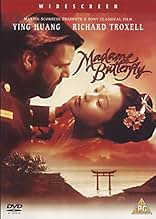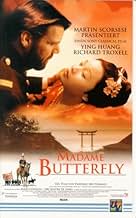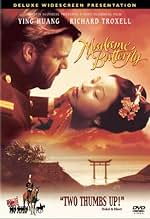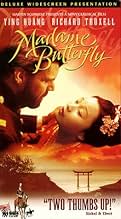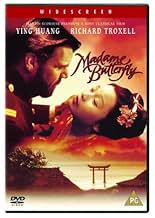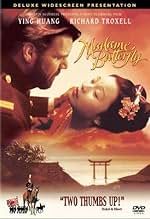Ajouter une intrigue dans votre langueThe story of a young geisha who falls madly in love with an american captain that travels all around the world collecting hearts.The story of a young geisha who falls madly in love with an american captain that travels all around the world collecting hearts.The story of a young geisha who falls madly in love with an american captain that travels all around the world collecting hearts.
- Director
- Writers
- Stars
- Prix
- 1 victoire et 1 nomination au total
Avis en vedette
This gorgeously shot and brilliantly directed film version of the opera is the most passionate I've seen. The acting is unusually detailed and truthful for an opera, especially Butterfly's total commitment and Pinkerton's breezy lust.
But why didn't we see his ship sail into the bay? The water and mountains seemed destined for that shot, but didn't deliver. The boy was too old, the voice of the "uncle" in the sky didn't work, but generally it was a deeply moving experience, rising to a terrific climax in her suicide and his remorse. That last closeup of Pinkerton, racked by remorse, lifting the dying Butterfly, was powerful. The film aired in Canada on Aug 8 on the Bravo! TV network. I couldn't tear myself away to get to a party till the final credits were rolling.
But why didn't we see his ship sail into the bay? The water and mountains seemed destined for that shot, but didn't deliver. The boy was too old, the voice of the "uncle" in the sky didn't work, but generally it was a deeply moving experience, rising to a terrific climax in her suicide and his remorse. That last closeup of Pinkerton, racked by remorse, lifting the dying Butterfly, was powerful. The film aired in Canada on Aug 8 on the Bravo! TV network. I couldn't tear myself away to get to a party till the final credits were rolling.
This really is a great opera movie. All the actors have the right age and -when it comes to appearance- the right "beauty". Butterfly is a young girl in the story, and in this movie she looks as one (and she is only in her early twenties). Nevertheless she does all the singing herself. She has won prizes in opera competitions and is very convincing. She is from China, not Japan, and has the perfect voice for the part. Who would ever find this story believable with a 40-years old soprano? Now with this young Asian actress/singer one is moved as one should be. Not only the singing, but also the emotions are clear and real. This could never be achieved in play-back from a different singer. All the other main characters are (very) good actors and sing their own parts (very well). The setting is beautiful, though not in Japan, but in Tunisia (I read afterwards). The orchestra plays well (under James Conlon). In fact everything is good. Only a few minor parts are sung by different persons than the (Asian) actors. Summarizing: The best Butterfly I have ever seen and probably the best I will ever see from now on.
Unfortunatly , their lips aren't moving right. So their either lip synching or it's been dubbed. Richard Troxell's the best in this. His emotion drips off the screen. So's his cohort. The actress playing butterfly looks and acts too old for the part. I personally loved this film. But as they are singing in opera terms, many might not appreciate it. It's up to you. (example: I found it to be uplifting and another person found it to be more depressing than The Refelecting Skin.) So what you take from it is entirely up to you. :)
9/10 (can't give it a full 10 because of the dubbing/lip synch problems.
Quality: 9/10 Entertainment: 10/10 (how can you not. with such powerful singing) Replayable: 6/10
9/10 (can't give it a full 10 because of the dubbing/lip synch problems.
Quality: 9/10 Entertainment: 10/10 (how can you not. with such powerful singing) Replayable: 6/10
Madame Butterfly is a beautiful, romantic and dramatic story. It is all about a fifteen years old geisha called Cio Cio-San, who gets married with the official of the American navy, Benjamim Franklin Pinkerton.
Pinkerton, the fiancé, is just buying a woman, as he did in other parts of the world, to be close in his moments of loneliness, while he doesn't marry a true American wife.
After three years of marriage, Pinkerton goes back to the United States, leaving Butterfly with a small son he never knew. Cio Cio San believes that her husband will return, and she refuses to assume her Japanese values and a new life.
During all the story, Cio Cio-San will always count with the unconditional friendship of the maid Suzuki.
To get things worst, Butterfly receives a letter of Pinkerton informing that he will not return anymore, making clear that he married an American woman. Butterfly interprets his words in an erroneous way, and she sees new hopes for of her husband arrival.
He returns, however, to look for his son.
The end of the plot shows the suicide of Butterfly, when noticing that she had lost everything that she loved, the husband and now also the son. (She had used as a weapon her father's sword, with the inscription: "To die with honor, when one can no longer live with honor". The now-humiliated, heartbroken daughter of a disgraced samurai, she dies proudly - as a samurai.)
The opera is tragic, because Cio Cio-San really believes in her illusions, and she only notices the mistakes very late.
There are difficulties, for example, how she was renounced by her relatives by converting Pinkerton's religion (Catholicism), or her son, that came to this world, only after the American had already left.
The history is full of cultural contrasts, since the story is in the Japan of the beginning of XX century, where the prejudices were worst.
The reason whyI liked this movie so much : in my opinion, it is the best Madame Butterfly I have ever seen in a movie. I was surprised to see that the movie is all sang in opera terms. Many people might not like that.
The sets are beautiful, and the movie was made full of details, to really show the Japanese habits, thoughts and life style.
Frédéric Mitterrand had even the concern of choosing Asian actors to play in the cast, much better then Jean Pierre-Ponnele's version, where all of the actors are westerns.
Pinkerton, the fiancé, is just buying a woman, as he did in other parts of the world, to be close in his moments of loneliness, while he doesn't marry a true American wife.
After three years of marriage, Pinkerton goes back to the United States, leaving Butterfly with a small son he never knew. Cio Cio San believes that her husband will return, and she refuses to assume her Japanese values and a new life.
During all the story, Cio Cio-San will always count with the unconditional friendship of the maid Suzuki.
To get things worst, Butterfly receives a letter of Pinkerton informing that he will not return anymore, making clear that he married an American woman. Butterfly interprets his words in an erroneous way, and she sees new hopes for of her husband arrival.
He returns, however, to look for his son.
The end of the plot shows the suicide of Butterfly, when noticing that she had lost everything that she loved, the husband and now also the son. (She had used as a weapon her father's sword, with the inscription: "To die with honor, when one can no longer live with honor". The now-humiliated, heartbroken daughter of a disgraced samurai, she dies proudly - as a samurai.)
The opera is tragic, because Cio Cio-San really believes in her illusions, and she only notices the mistakes very late.
There are difficulties, for example, how she was renounced by her relatives by converting Pinkerton's religion (Catholicism), or her son, that came to this world, only after the American had already left.
The history is full of cultural contrasts, since the story is in the Japan of the beginning of XX century, where the prejudices were worst.
The reason whyI liked this movie so much : in my opinion, it is the best Madame Butterfly I have ever seen in a movie. I was surprised to see that the movie is all sang in opera terms. Many people might not like that.
The sets are beautiful, and the movie was made full of details, to really show the Japanese habits, thoughts and life style.
Frédéric Mitterrand had even the concern of choosing Asian actors to play in the cast, much better then Jean Pierre-Ponnele's version, where all of the actors are westerns.
Filming an opera, especially one as globally well known as Puccini's, is a daunting challenge because so much of what has been composed and dramatized has been designed specifically for the stage of an opera hall. On one end, there have been superb video recordings of great stage performances, such as the 2005 Salzburg Festival production of Verdi's "La Traviata" with Anna Netrebko and Rolando Villazón. On the other end are adaptations that try to cinematize operas with real locations, though most often with some deficiencies, for example, Barbara Willis Sweete's 2002 production of Gounod's "Roméo et Juliette" with Roberto Alagna and Angela Gheorghiu frankly too old to play the young lovers. In the latter camp, this 1995 French-financed film shows director Frédéric Mitterand making a valid attempt toward authenticity, but he misses a key opportunity to open up the visual and sensory possibilities beyond the obvious. Despite the creative use of Tunisian locations to replicate early 1900's Japan, the result still feels oddly stage-bound and dramatically inert despite some bravura musical moments.
The heavily masochistic story is familiar. In 1904, U.S. naval officer Lieutenant Pinkerton, while stationed in Nagasaki, marries a teenaged girl named Cio-Cio San. Despite their affections for one another, he cavalierly sees the marriage as one of convenience, and when his assignment is done, he goes back to the U.S. with no intention of returning. Cio-Cio San, however, takes the relationship so seriously that she sacrifices her family for the marriage. Three years pass by, but it does not deter Cio-Cio San from hoping for Pinkerton's return since it turns out that she has borne their son in the meantime. Finally, a ship arrives and Cio-Cio San correctly surmises that he is on it. However, tragedy ensues since Pinkerton has remarried in the interim and wants to take his son back to America with him and his new American wife. Taken on the surface, the opera seems defiantly anti-American in showing Pinkerton to be a superficial cad despite how remorseful he may appear at the end, but it also takes a sideswipe at the purportedly subservient nature of Japanese women since her own self-delusions are so intractable. Regardless, the heartstrings are pulled at the right moments when the opera is acted in the manner Puccini intended.
Chinese soprano Ying Huang was chosen over hundreds of young singers for the title role, and while she does not really look Japanese, she displays a sweetly supple voice as she performs the dramatic arc of Cio-Cio San's plight. However, as a screen actress, Huang lacks a certain lightness in the early romantic scenes and seems a bit at sea with the later melodramatic moments. Even though she lacks the plummy depths of a Callas or a Tebaldi, she provides affecting renditions of the two pivotal arias, "Un bel dì vedremo" when Cio-Cio San looks out into the harbor awaiting Pinkerton's return, and her death scene, "Con onor muore". As Pinkerton, admittedly a tough role to play much less sympathize with, American tenor Richard Traxell matches Huang well vocally, but again his acting seems a bit shallow as he only shows unrelenting bravado in the first act and guilt-ridden regret in the third. The others in the cast fare better since there are less dramatic demands on them, in particular, American baritone Richard Cowan as the sympathetic consul Sharpless and acclaimed Chinese mezzo-soprano Liang Ning as the maid Suzuki.
Despite some nice art direction, the visual presentation feels somewhat flat when colors should really pop and the camera be more mobile. There are also some scenes that simply do not work such as having Cio-Cio San's uncles come to banish her from the family in an airborne fashion and the use of anachronistic Japanese newsreel footage as a musical bridge. However, the sound itself is fine with superb orchestral support from the Orchestre de Paris under the baton of James Conlon. There is one extra with the 2002 DVD, a 12-minute making-of featurette which really amounts to following Huang from her initial audition through the actual production.
The heavily masochistic story is familiar. In 1904, U.S. naval officer Lieutenant Pinkerton, while stationed in Nagasaki, marries a teenaged girl named Cio-Cio San. Despite their affections for one another, he cavalierly sees the marriage as one of convenience, and when his assignment is done, he goes back to the U.S. with no intention of returning. Cio-Cio San, however, takes the relationship so seriously that she sacrifices her family for the marriage. Three years pass by, but it does not deter Cio-Cio San from hoping for Pinkerton's return since it turns out that she has borne their son in the meantime. Finally, a ship arrives and Cio-Cio San correctly surmises that he is on it. However, tragedy ensues since Pinkerton has remarried in the interim and wants to take his son back to America with him and his new American wife. Taken on the surface, the opera seems defiantly anti-American in showing Pinkerton to be a superficial cad despite how remorseful he may appear at the end, but it also takes a sideswipe at the purportedly subservient nature of Japanese women since her own self-delusions are so intractable. Regardless, the heartstrings are pulled at the right moments when the opera is acted in the manner Puccini intended.
Chinese soprano Ying Huang was chosen over hundreds of young singers for the title role, and while she does not really look Japanese, she displays a sweetly supple voice as she performs the dramatic arc of Cio-Cio San's plight. However, as a screen actress, Huang lacks a certain lightness in the early romantic scenes and seems a bit at sea with the later melodramatic moments. Even though she lacks the plummy depths of a Callas or a Tebaldi, she provides affecting renditions of the two pivotal arias, "Un bel dì vedremo" when Cio-Cio San looks out into the harbor awaiting Pinkerton's return, and her death scene, "Con onor muore". As Pinkerton, admittedly a tough role to play much less sympathize with, American tenor Richard Traxell matches Huang well vocally, but again his acting seems a bit shallow as he only shows unrelenting bravado in the first act and guilt-ridden regret in the third. The others in the cast fare better since there are less dramatic demands on them, in particular, American baritone Richard Cowan as the sympathetic consul Sharpless and acclaimed Chinese mezzo-soprano Liang Ning as the maid Suzuki.
Despite some nice art direction, the visual presentation feels somewhat flat when colors should really pop and the camera be more mobile. There are also some scenes that simply do not work such as having Cio-Cio San's uncles come to banish her from the family in an airborne fashion and the use of anachronistic Japanese newsreel footage as a musical bridge. However, the sound itself is fine with superb orchestral support from the Orchestre de Paris under the baton of James Conlon. There is one extra with the 2002 DVD, a 12-minute making-of featurette which really amounts to following Huang from her initial audition through the actual production.
Le saviez-vous
- AnecdotesThe entire Japanese village set and house were built in Tunisia, Northern Africa.
- GaffesDuring Act 2 and Act 3, a blooming wisteria is shown to be growing along the house's roof above the porch. In reality wisteria would not have been grown here as the house's structure would have been unsuitable for it. Wisteria is a plant known to become heavy and massive with age; it would have been grown along a sturdy trellis or stone wall instead as not to cause any damage.
- Citations
Lieutenant Benjamin Franklin Pinkerton: She's like a porcelain doll. She sets me on fire.
Meilleurs choix
Connectez-vous pour évaluer et surveiller les recommandations personnalisées
- How long is Madame Butterfly?Propulsé par Alexa
Détails
- Date de sortie
- Pays d’origine
- Langue
- Aussi connu sous le nom de
- Madame Butterfly, de Frederick Mitterand
- Lieux de tournage
- sociétés de production
- Consultez plus de crédits d'entreprise sur IMDbPro
Box-office
- Brut – États-Unis et Canada
- 65 196 $ US
- Fin de semaine d'ouverture – États-Unis et Canada
- 6 027 $ US
- 5 mai 1996
- Brut – à l'échelle mondiale
- 65 196 $ US
Contribuer à cette page
Suggérer une modification ou ajouter du contenu manquant

Lacune principale
By what name was Madame Butterfly (1995) officially released in India in English?
Répondre
